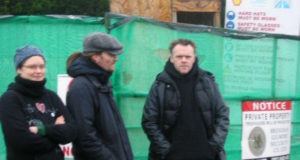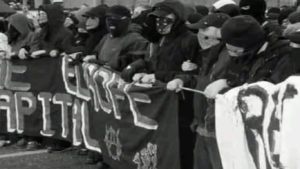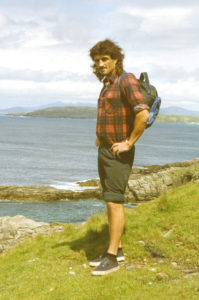1990: Spycop John Dines Boasts of His Poll Tax Arrest
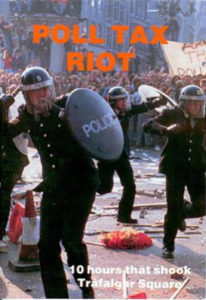
Poll Tax Riot pamphlet cover
Twenty eight years ago today, 31 March 1990, Trafalgar Square hosted a major demonstration against the poll tax that became a riot.
The Conservative regime’s plan to change local government funding property rates based on the value of the house to a charge per person had caused uproar. Eventually, it would be overturned, and take Thatcher’s premiership with it.
Among the crowd on the March 1990 demonstration was John Barker, aka Special Demonstration Squad officer John Dines.
Maintaining character, Dines later designed, printed and sold a benefit poster for those arrested on the day. He also wrote an account for the subsequent Poll Tax Riot pamphlet.
Many officers from Britain’s political secret police were agents provocateur both in deed and in the written word. Just last week Roger Pearce was identified as the author of what the Undercover Policing Inquiry called ‘virulently anti-police’ articles for Freedom Newspaper in the early 1980s. Twenty years later, Mark Kennedy was a frequent contributor of such invective to Indymedia under the name Lumsk.
In between, in 1990 John Dines penned this:
MR. SWEENEY AND ME
As I lay face down in a gutter in Whitehall, with a policeman’s boot in the back of my neck and his two mates wrenching my arms from my shoulders, their macho sergeant bawling instructions on how best to incapacitate me, I briefly pondered my ‘wrongdoing’ in trying to prevent someone I‘d never met before from being arrested for shouting his opposition to the Poll Tax. The kick in the forehead diverted my thoughts and l was bundled into one police van, manacled so tightly my hands went blue, then dragged across the road, booted and thumped as l was pushed into a second van.
We sped off horns, sirens blaring madly, through red traffic lights, along the wrong side of the road and up pavements. l was sure that the guy I had tried to help who was being trampled upon by his captors must be the world’s most wanted fugitive. None of it, this was just members of the world’s finest police force maintaining the Queens’ Peace.
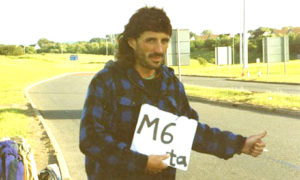
SDS officer John Dines whilst undercover as John Barker
l was one of the thousands and thousands of people who had left Kennington Park about an hour earlier. I was with a group of friends, all much like me, not really poor but no spare cash at the end (or beginning) of the week.
Some of us were working, some of us on the dole, some on housing benefit, some squatting because they couldn’t afford to pay for a reasonable home, others because there aren’t any homes available, some folks had worked all their lives to provide for their families, some had never been able to find work.
We all had something in common – we were all working class, and in today’s wonderful British society we had become part of the growing, but powerful underclass. The Poll Tax was another financial burden to us. like all the other benefit and welfare cuts we’ve experienced, particularly in recent years. We’ve got no money left to pay now though, but “ode seems to listen or care. Well, we came to bloody shout it loudly enough so that we couldn’t be ignored. and didn’t we shout?
I was surprised by the huge, vast crowds who had turned up to demonstrate their opposition to the poll tax. Sure, there were many politicos espousing the virtues of other terms of extremist control. But overwhelmingly those present were ordinary families, pensioners, community groups, disabled folk, there were musicians, there was dancing, there were balloons, there was anger, annoyance and frustration – but our march was peaceful. There were ‘suits’ in the crowd, there were cops in the air, they were high on buildings with their telescopic sights and their focused binoculars, their videos were running and soon so were they, for this was going to be our day.
Such was the enormity of the crowd that the march eventually bottlenecked from Trafalgar Square to Lambeth Bridge. And then the realisation – we were stopped opposite Downing Street, the home of our democratic leader, “dear Maggie”.
Nevertheless we stood in reverence, the occasional ribald comment of course, but there were no bricks, there was no barrage, there was no onslaught on the thin blue line guarding the entrance to No. 10. After all, we had no weapons, no truncheons, we had no specially designed riot overalls, no helmets and visors, no jackboots, no leaders directing operations, we didn’t come charging on horseback, our dogs were strictly anti-Poll Tax mongrels.
I remember children spilling onto a nearby glass verge, somebody uncoupling fencing to prevent us blindly falling over it, people sitting in the roadway, nowhere to move, penned in by barriers manned by cops. In front of us thousands of marchers, behind us many thousands more.
Obviously the Metropolitan Police Force’s expertly trained riot cops couldn’t handle such a confrontation. Passivity could not be tolerated. A foray by six brave Constables led by an Inspector was easily repelled. We weren’t going to be arrested for sitting on the bloody ground. Not to be defeated (not yet anyway), a charge by about 20 cops, truncheons out, fists, boots flying into kids, women, the old, whoever got in their way – l was soon to meet the gutter.
There were five of us in a cell made for one; 63 on a corridor of cells cosily constructed for 10 people. Food, no problem there. We each got a packet of custard cream biscuits after seven hours – shame I don’t eat them! Drinks, yep as much water as your bladder could hold, because the toilet didn’t flush. Air, sure, we swapped the contents of each other’s lungs for about 14 hours. Solicitor. I’m definitely allowed one of them, just a shame he wasn’t bloody interested. He reassured me that I could be charged with causing an affray even if I was acting on my own. There was nothing he could do for me however and it wasn‘t worth his while coming to the station (his words). He must have known I’d be on legal aid.
What about speaking to the lay visitors? Well, why not. Why indeed, these middle aged arseholes clad in Harrods’ latest fashions, blue rinses, adorned with jewellery, 1 lb. of plums in their gobs, just out of the ‘Upstairs…’ part of Eaton Square, they’ll understand how I feel, they’re in touch with local issues. The scumbags could hardly bring themselves to inhale the putrefied air in the cell corridor. Someone further along just beat me in telling them to go back home, only I think she said “why don’t you fuck off?”
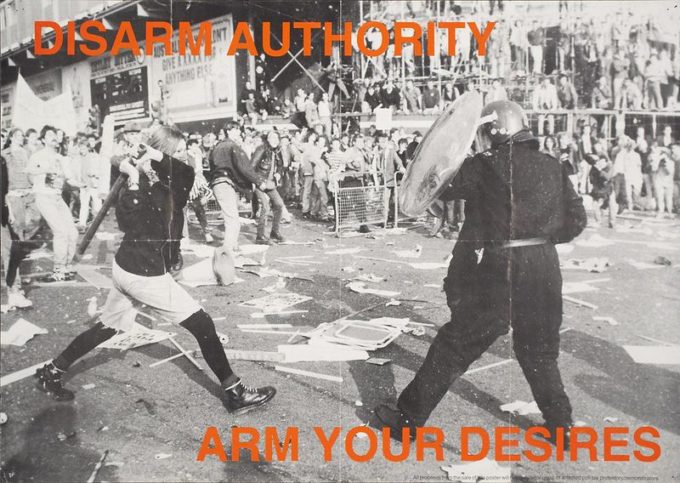
‘Disarm Authority Arm Your Desires’ – Poll Tax Riot poster designed & distributed by undercover police officer John Dines to raise funds for those arrested in the riot on 31 March 1990
Cellmates: a traveller got himself arrested for shouting and using a profane four lettered word. A shoe salesman who protested to a senior police officer about the manner in which a person was arrested quickly found himself on the floor of a police van with a black eye. Still, the salesman was black, so guess he must have deserved it! An engineer was amongst a group of peaceful protesters who were charged at by cops on horses, he was one of those who fell over so he must have been guilty of something.
And, finally, through the cell door walked this man mountain. 18 stone, 6’4”, beer belly, flash leather jacket, mohair trousers, crocodile skin shoes, Armani shirt – must be a fraudster – not at all. “I was on my way back home”, his story goes, “when I walked into this riot. Never have liked cops, so thought I’d have a bit of action”. This colossus found a half brick and with deadly aim caught a cop on the back of the head; out like a light he said. He was then jumped on by two riot clad officers, but our hero threw them off and eventually it took six of the bastards and burst eardrums to restrain him.
Tarzan could well understand their anger however, for he had once been a paratrooper and had served the good old British Army on the streets of Belfast, eh! A philosophical individual, but he was upset on two counts: firstly, his mum would go apeshit when she found out, secondly, having been arrested for “incitement to riot”, he was bound to lose a new job he was due to start the following month – he was to become a Prison Officer! Amongst other things, this character merited some in depth discussion, but I was halted from discovering the reasons for his actions, bearing in mind his former and intended employment, when he simply said “I fucking hate cops”.
Some 14 hours after being arrested, I was taken to the custody centre where some young Sweeney type ’intellectual’ asked me if I was a member of Militant, what an insult, and then suggested I must be “some sort of socialist”, before letting me go, warning me not to fail to turn up at court to answer my charge.
Well, l did fail to turn up, so bollocks Mr. Sweeney. As I walked home I saw iron barricades still strewn along the length of Whitehall, a crushed cop’s cap lay amongst the rubbish on the pavement, hundreds of ’No Poll Tax’ placards were discarded everywhere, some decorating the Cenotaph, that meaningless monolith in the centre of Whitehall.
The scale of the events I had missed were becoming excitingly apparent. The stench of burning wafted down Whitehall and as I reached Trafalgar Square I saw the ashen remains of buildings in Northumberland Avenue, the smell of wasted Portakabins was now overpowering, smoke still billowing around Trafalgar Square, fire fighters still dousing neighbouring premises. The shattered windows of the South African Embassy further lifted my spirits and I couldn’t resist an ear to ear grin as a mob of miserable cops walked towards me, peering out from under the brims of their helmets, hunched shoulders, literally ’plodding’ along. Though l had missed it, I knew the bastards had taken a real good hiding.
Whilst undercover, John Dines deceived activist Helen Steel into an intimate relationship. They moved in together, living in a house he had found for them. It backed on to the home of the family of Winston Silcott’s family, who were campaigning for his conviction to be overturned after he and others were framed by the police for the death of PC Keith Blakelock in 1985.
Soon after after Silcott had his conviction quashed in November 1991, Dines’ undercover deployment ended and he disappeared from his activist life.
His abuse of Steel was one of the cases in the Metropolitan Police’s landmark apology of 2015. He now lives in Australia, training police in infiltration and surveillance of political activists.
Here’s Helen Steel talking about her relationship with Dines in 2014:

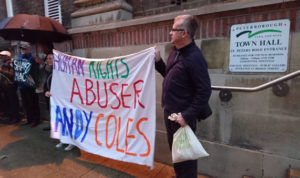
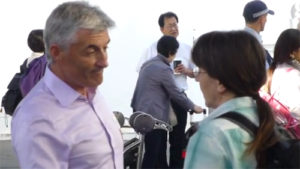
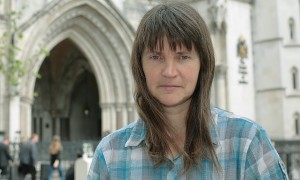
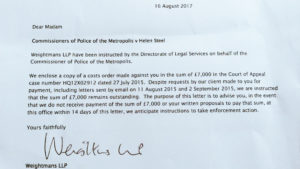 Despite the hearing lasting only about an hour, the police then claimed over £10,000 costs. Although later reduced to £7,000, the ludicrous amounts charged act as a deterrent, intimidating members of the public seeking accountability for wrongdoing committed by police officers. The threat of such an award can be used by the police as a means to intimidate people out of seeking redress.
Despite the hearing lasting only about an hour, the police then claimed over £10,000 costs. Although later reduced to £7,000, the ludicrous amounts charged act as a deterrent, intimidating members of the public seeking accountability for wrongdoing committed by police officers. The threat of such an award can be used by the police as a means to intimidate people out of seeking redress.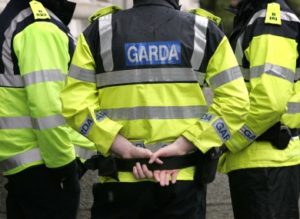 Shortly after the truth about undercover officer Mark Kennedy hit the headlines in January 2011, officials from many of the 11 countries he visited wanted answers. In Ireland, the Minister of Justice asked the police to write a report on his visits.
Shortly after the truth about undercover officer Mark Kennedy hit the headlines in January 2011, officials from many of the 11 countries he visited wanted answers. In Ireland, the Minister of Justice asked the police to write a report on his visits.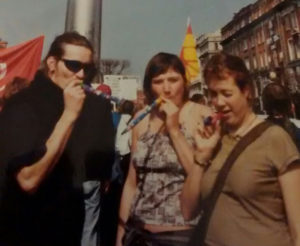
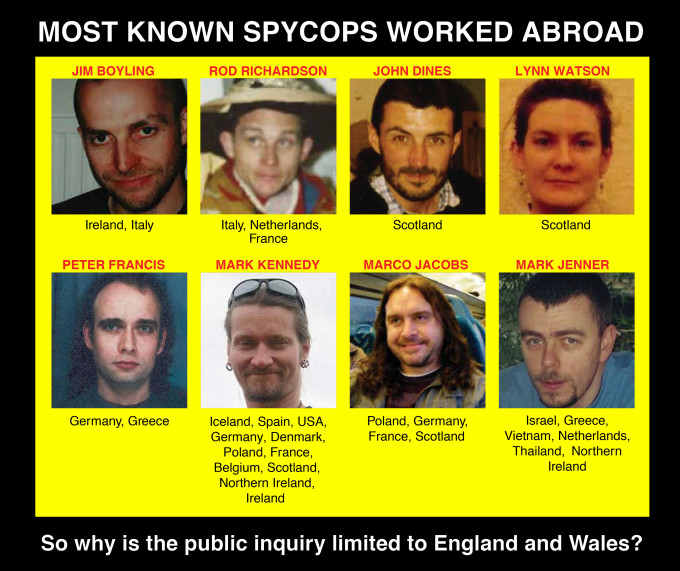 As children in school we are taught that the best way to organise a nation in the interest of its citizens is with a democratic system, and that this system can’t be flawed because of its checks and balances. Yet recently the Irish government has been proving that the opposite is true, it is operating to protect itself and its security apparatus against the best interests of the people.
As children in school we are taught that the best way to organise a nation in the interest of its citizens is with a democratic system, and that this system can’t be flawed because of its checks and balances. Yet recently the Irish government has been proving that the opposite is true, it is operating to protect itself and its security apparatus against the best interests of the people.
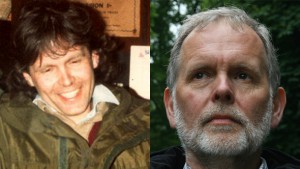
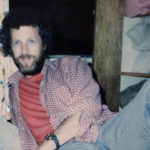

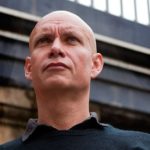
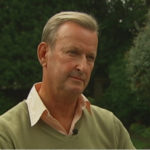

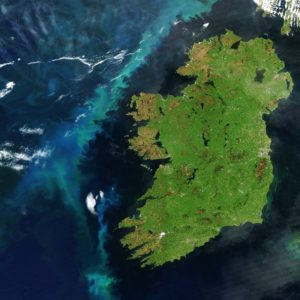 Of the thousands of people targeted by Britain’s political secret police, around 180 were known to be so significantly impacted that they have been granted ‘core participant’ status at the forthcoming
Of the thousands of people targeted by Britain’s political secret police, around 180 were known to be so significantly impacted that they have been granted ‘core participant’ status at the forthcoming 